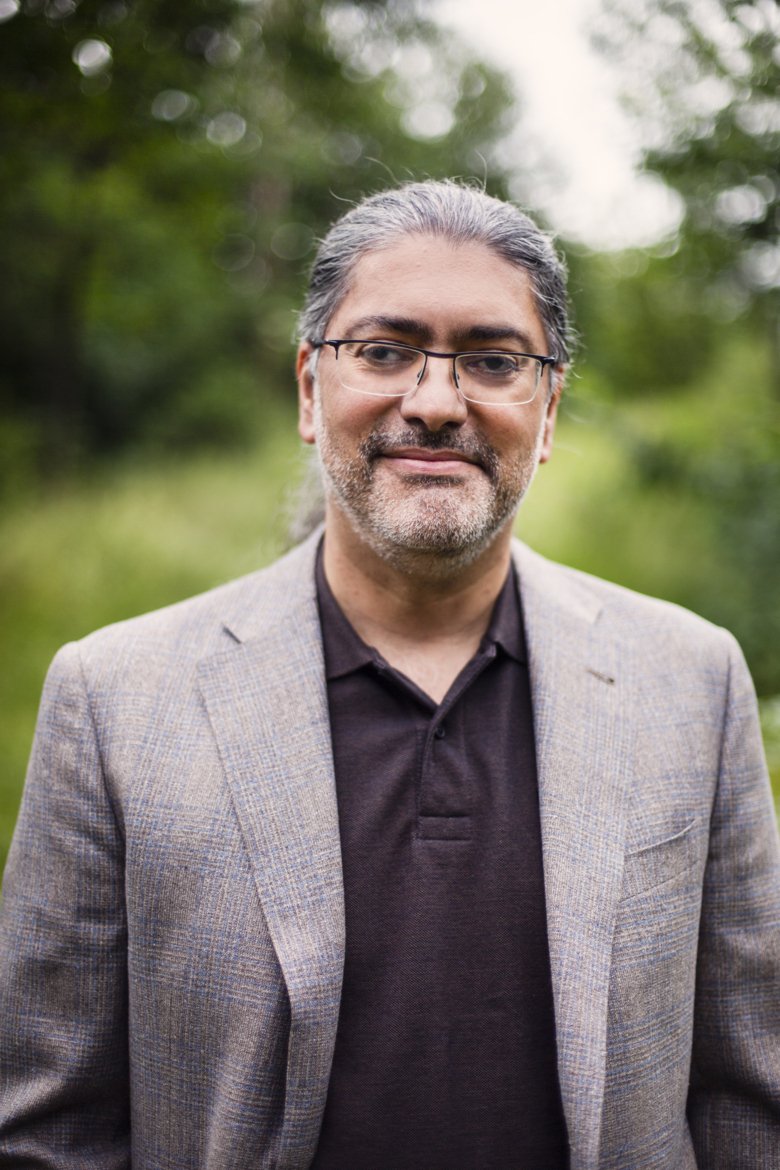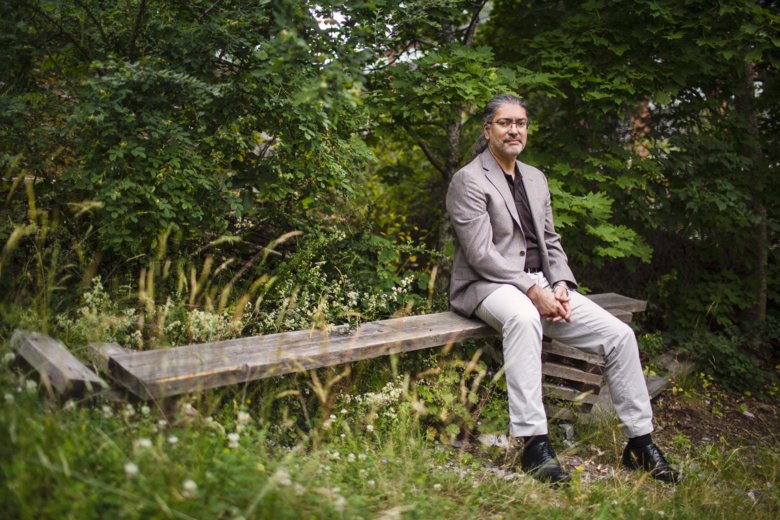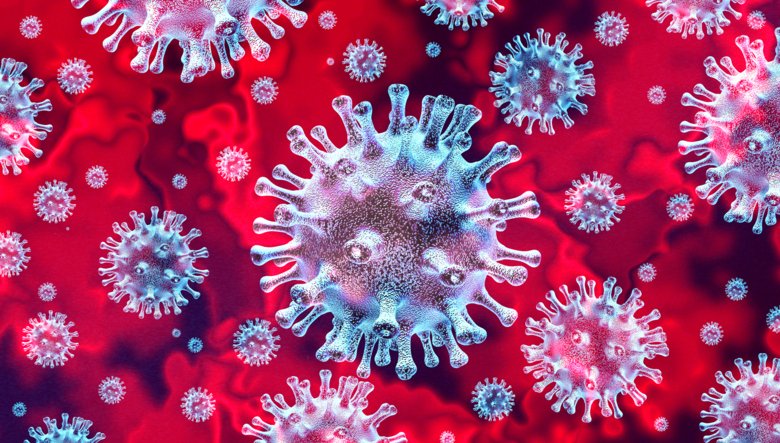He is fighting the new coronavirus
Virus researcher Ali Mirazimi has dedicated himself full-time to the coronavirus since the outbreak of the pandemic in the beginning of 2020. However, in the midst of his work to identify new drugs and vaccines, he too was struck down with COVID-19. He is now fully recovered and hopeful of a breakthrough.
Name: Ali Mirazimi.
Title: Adjunct professor at the Department of Laboratory Medicine, Karolinska Institutet. He also works at the National Veterinary Institute (SVA) and the Public Health Agency of Sweden.
Age: 52.
Family: Partner.
Motto: Nothing is impossible.
How I relax: Sleep – that always works when I need it. Karate training when I have the time.
Inspired by: My girlfriend – she thinks along different lines and lives more in the moment. My karate trainer is also a role model – he’s almost a pensioner but he’s still better than me.
Most unexpected research finding: They’re all equally unexpected! There’s no need to research what you already know.
Best attributes as a researcher: I am extremely flexible.

Text: Cecilia Odlind, first published in Swedish in Medicinsk Vetenskap, No 3/2020.
In April 2020, as Ali Mirazimi was working non-stop to manage several major research projects looking at the new coronavirus and found himself a sought-after interviewee with the media, he himself contracted COVID-19.
“I was very ill but was unwilling to seek medical care. Probably because I’m a bit macho,” admits Ali Mirazimi.
In the end, hospitalisation proved unavoidable – four days in total. He had suffered from something known as a cytokine storm, an overreaction of the immune system to a viral infection that causes uncontrolled inflammation. Thanks to cortisone treatment administered at a late stage of infection, when the immune system had been able to build specific defence cells, the reaction was suppressed.
“This had an immediate effect and I got better. By my third day back at home I felt ready for my usual walk, but I only made it as far as the local supermarket. I was left sitting on a bench, completely exhausted,” says Ali, who has now recovered. He has no interest whatsoever in how he was infected: “I look forwards, not backwards.” That said, he was interested in why he in particular became so ill. “Nobody knows why different people react so differently to this coronavirus but future research will provide answers,” he says.
Interested in deadly virus
Before the corona pandemic, Ali Mirazimi’s main focus was on Crimean-Congo haemorrhagic fever (CCHF), a rare virus that can cause serious illness in which the infected bleed from every orifice. The mortality rate varies but can be as high as 30%.
“That’s my favourite virus. When I began specialising in it in the early 2000s I was almost alone in the field. Not many people were interested in researching it. As it is highly dangerous and contagious, all work on it had to be conducted in a biosafety laboratory. That made the whole enterprise extremely difficult. And when people say that something is impossible, that’s when I get going,” he says.
Since 2002, Ali has been working in the high-containment laboratory at what is now the Public Health Agency of Sweden, the only one of its kind in northern Scandinavia. When the Ebola virus struck several African nations between 2014 and 2016, the European Union asked whether there were any similar diseases in Europe. An analysis highlighted CCHF, which infects some 1,000 people each year, mainly in Turkey. The species of tick that carries the disease is spreading due to climate change and has recently been found in northern Europe. With this in mind, Ali Mirazimi was tasked with leading the work of developing a vaccine to CCHF. The project is scheduled to continue until 2023.
“At the moment we are planning to test the vaccine in a first clinical phase,” he says.
In parallel with this, research is also underway to simplify the diagnosis of haemorrhagic fevers (fevers characterised by bleeding) such as Ebola and CCHF, so that treatment can be quickly administered.
Given his background working with vaccines and contagious viruses, Ali Mirazimi was ready to take on the new coronavirus when it struck. That said, he had no premonition.
“We were prepared for an influenza pandemic, but not SARS-CoV-2. This is a completely new virus so nobody could have guessed it was coming,” he says.
Thus far, he has been involved in three major corona projects that are currently consuming most of his waking hours. The first is looking at a drug that can be administered even in the latter stages of the disease. The angiotensin-converting enzyme 2 (ACE2) is attached to the membranes of cells in the lungs, kidneys and other organs, where it helps to regulate blood pressure. It is already known that the SARS virus can bind to the ACE2 receptor, thereby infecting cells.
“By giving the free receptor as a drug, we fool the virus into binding to that instead, thus reducing the invasion of cells,” explains Ali Mirazimi.
The drug is being tested in several European countries, with an initial report from Austria showing positive results.
“We are very hopeful but, at the same time, we are prepared for the fact that it may not work. That’s how it is with drug development, but the project can also pay off in other ways; we are simultaneously looking for new molecules using artificial intelligence,” he says.

Searching for a vaccine
Meanwhile, Ali Mirazimi is hunting a preventive vaccine against new coronaviruses in collaboration with Professor Matti Sällberg, a colleague at the same department. Here too, they are aware that the objective may never be achieved.
“There are over one hundred vaccine projects underway worldwide. A handful will succeed but nobody knows which, and every project will contribute with increased knowledge and understanding. Perhaps we may also discover vaccines against other coronaviruses that may appear in future; if nothing else, we will be considerably better prepared,” he says.
The diversity of projects can also be explained by the fact that there are so many different approaches available to those looking for a vaccine.
“Of course, the idea is to prepare the immune system to recognise the virus. To this end you can use all or parts of the dead or weakened virus. Or you can use the protein shell around the virus itself. Yet another variation is to use DNA or RNA that encodes for virus proteins,” he explains.
In their particular case, they have chosen to use DNA, although not from the ‘obvious’ protein on the virus’ surface but from other proteins. These are tested in various combinations, either in combination or alone.
“It is important to bear in mind that the majority of drug and vaccine research never leads to a product. It is therefore good that so many different projects are going on simultaneously, so that we don’t bet everything on a single hand.”
In a third project, they have developed a quick test for the coronavirus that is currently in use in Belgium. All of the projects are international collaborations, with Ali Mirazimi taking the coordinating role in many cases. This seems to suit someone who, according to a colleague, is “an all-round good guy who is brilliant at creating networks”.
“I enjoy coming into contact with all types of people and getting them to work together, utilising their various strengths to make sure the machinery runs as smoothly as possible, nothing beats that. I often fall back on my own prejudices, but I love to have them disproved. And, of course, they are all the time,” he laughs.
One prejudice about Iranians, like Ali himself, is that they all want their children to become dentists or doctors; however, he himself lacked the patience to study for seven years.
“The biomedicine programme was a shortcut into the world of research, which is where I wanted to be.
Challanged by new experiences
Ali Mirazimi arrived in a chilly Stockholm from Teheran at the age of 18. He couldn’t speak the language and didn’t look like everyone else. What might have been a frightening predicament became in his eyes a challenge to spur him on.
“I found it extremely exciting to discover a new country and new people. It’s more enjoyable to go where you’ve never been before than to stay in familiar surroundings. The same applies to research. It’s like entering a dark room and trying to find your bearings. It’s difficult but that’s what makes it interesting,” he enthuses.
Ali Mirazimi on...
...his ponytail:
Well, absolutely, strength is in the hair! In the research community I stick out with my hair; people wonder: “Is he a rock star?” If you stick out, people tend to listen to you.
...being a researcher:
I enjoy deciding for myself what to do, when to do it and how it should be done. I would therefore probably find it hard to have a ‘normal’ job.
...the scientific community and the coronavirus:
Back when the SARS epidemic broke out in 2002, researchers showed that they could set their egos and careers aside when needed. There has been a similar open climate of cooperation during the pandemic.
...the corona situation during the autumn:
I think we will see outbreaks here and there around Sweden. In the best-case scenario, there will be vaccine available to at-risk groups at the beginning of next year – the same goes for medicines. The healthcare service has also learned a great deal so I’m hopeful for the autumn.
More reading
 Photo: Getty Images
Photo: Getty ImagesDeveloping a vaccine against the new corona virus
Researchers worldwide are trying to develop a vaccine and antiviral treatments against the new corona virus spreading in China. At Karolinska Institutet, virus researchers Ali Mirazimi and Matti Sällberg are working to develop a prototype vaccine against the virus.
